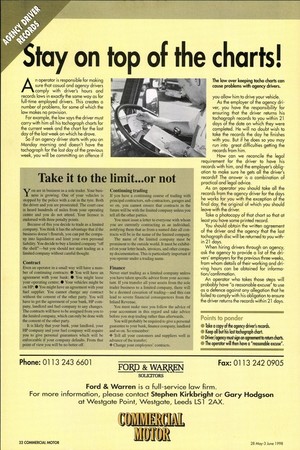tay on top of the charts!
Page 34

If you've noticed an error in this article please click here to report it so we can fix it.
An operator is responsible for making sure that casual and agency drivers comply with driver's hours and records laws in exactly the same way as for full-time employed drivers. This creates a number of problems, for some of which the law makes no provision. For example, the law says the driver must carry with him all his tachograph charts for the current week and the chart for the last day of the last week on which he drove. So if an agency driver starts with you on Monday morning and doesn't have the tachograph for the last day of the previous week, you will be committing an offence if you allow him to drive your vehicle. As the employer of the agency driver, you have the responsibility for ensuring that the driver returns his tachograph records to you within 21 days of the date on which they were completed. He will no doubt wish to take the records the day he finishes with you. But if he does so you may run into great difficulties getting the records from him.
How can we reconcile the legal requirement for the driver to have his records with him, and the employer's obligation to make sure he gets all the driver's records? The answer is a combination of practical and legal advice. As an operator you should take all the records from the agency driver for the days he works for you with the exception of the final day, the original of which you should leave with the driver.
Take a photocopy of that chart so that at least you have some printed record. You should obtain the written agreement of the driver and the agency that the last tachograph disc will be returned to you within 21 days. When hiring drivers through an agency, ask the agency to provide a list of the drivers' employers for the previous three weeks, from whom details of their working and driving hours can be obtained for information/confirmation.
An operator who takes those steps will probably have "a reasonable excuse" to use as a defence against any allegation that he failed to comply with his obligation to ensure the driver returns the records within 21 days. Take it to the limit...or not you are in business as a sole trader. Your business is growing. One of your vehicles is stopped by the police with a cut in the tyre. Both the driver and you are prosecuted. The court case is heard hundreds of miles from your operating centre and you do not attend. Your licence is endorsed with three penalty points.
Because of this you decide to trade as a limited company. You think it has the advantage that if the business doesn't flourish, you can put the company into liquidation and limit your own personal liability. You decide to buy a limited company "off the shelf'—but you should not start trading as a limited company without careful thought.
Contract Even an operator in a small way will have a number of continuing contracts: • You will have an agreement with your bank: • You might lease your operating centre; • Your vehicles might be on HP; • You might have an agreement with your fuel supplier. You cannot change any contract without the consent of the other party. You will have to get the agreement of your bank, HP company, landlord and fuel company to any changes. The contracts will have to be assigned from you to the limited company, which can only be done with the consent of the other party.
It is likely that your bank, your landlord, your HP company and your fuel company will require you to give personal guarantees which will be enforceable if your company defaults. From that point of view you will be no better off. Continuing trading If you have a continuing course of trading with principal contractors, sub-contractors, garages a so on, you cannot ensure that contracts in t future will be with the limited company unless you tell all the other parties.
You must issue a letter to everyone with whom you are currently contracting as an individual, notifying them that as from a named date all contracts will be in the name of the limited company.
The name of the limited company must be prominent to the outside world. It must be exhibited on your letter heads, invoices, and other company documentation. This is particularly important if you operate under a trading name.
Finance Never start trading as a limited company unless you have taken specific advice from your accountant. If you transfer all your assets from the sole trader business to a limited company, there will be a deemed cessation of trading—and this can lead to severe financial consequences from the Inland Revenue.
You must make sure you follow the advice of your accountant in this regard and take advice before you stop trading rather than afterwards.
You will probably be required to give a personal guarantee to your bank, finance company, landlord and so on. So remember: + Tell all your customers and suppliers well in advance of the transfer; Change your employees' contracts. Points to ponder • Take a copy of the agency driver's records. • Keep all but his last tachograph chart. • Driver/agency must sign an agreement to return charts. • The operator will then have a "reasonable excuse".






















































































































